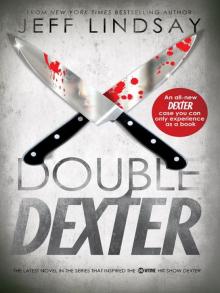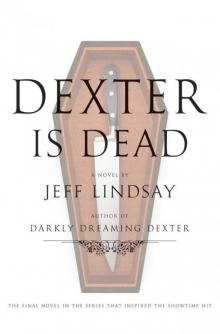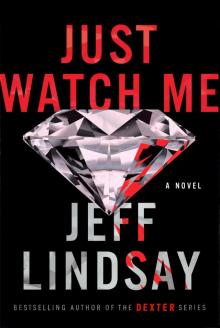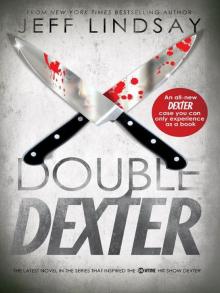- Home
- Jeff Lindsay
Dexter's Final Cut Page 2
Dexter's Final Cut Read online
Page 2
“Go right in,” she repeated, with a face that might have been carved from stone, or at least very hard pudding. I breezed past her and went through the door and into the conference room.
Captain Matthews sat at the head of the table, looking earnest, manly, and at least semi-noble, as he almost always did. Sitting to one side of him was my sister, Sergeant Deborah Morgan, and she did not look happy. Of course, she very seldom did; between her carefully cultivated Cop Scowl and her general outlook of surly watchfulness, the most cheerful expression she had ever managed in my presence was a look of grudging acquiescence. Still, this morning she looked very much displeased, even for her. I turned my gaze to the other three people sitting around the table, hoping for some clue to my sister’s malaise.
Sitting closest to the captain was a man who was clearly Alpha Dog of the group. He was about thirty-five and wore what looked like a very expensive suit, and Matthews had inclined his head toward the man in a way that went beyond deferential and nearly approached reverence. The man looked up at me as I entered, scanned me as if he was memorizing a row of numbers, and then turned impatiently back to Matthews.
Sitting next to this charming individual was a woman so startlingly beautiful that for a half moment I forgot I was walking, and I paused in midstep, my right foot dangling in the air, as I gaped at her like a twelve-year-old boy. I simply stared, and I could not have said why. The woman’s hair was the color of old gold, and her features were pleasant and regular, true enough. And her eyes were a startling violet, a color so unlikely and yet so compelling that I felt an urgent need to move near and study her eyes at close range. But there was something beyond the mere arrangement of her features, something unseen and only felt, that made her seem far more attractive than she actually was—a Bright Passenger? Whatever it was, it grabbed my attention and held me helpless. The woman watched me goggle at her with distant amusement, raising an eyebrow and giving me a small smile that said, Of course, but so what? And then she turned back to face the captain, leaving me free to finish my interrupted step and stumble toward the table once more.
In a morning of surprises, my reaction to mere Female Pulchritude was a rather large one. I could not remember ever behaving in such an absurdly human way: Dexter does not Drool, not at mere womanly beauty. My tastes are somewhat more refined, generally involving a carefully chosen playmate and a roll of duct tape. But something about this woman had absolutely frozen me, and I could not stop myself from continuing to stare as I lurched into a chair next to my sister. Debs greeted me with a sharp elbow to the ribs and a whisper: “You’re drooling,” she hissed.
I wasn’t, of course, but I straightened myself anyway and summoned the shards of my shattered dignity, looking around me with an attempt at regaining my usual composure.
There was one last person at the table whom I had not registered yet. He had put a vacant seat between himself and the Irresistible Siren, and he leaned away from her as if afraid he might catch something from her, his head propped up on one elbow, which was planted casually on the table. He wore aviator sunglasses, which did not disguise the fact that he was a ruggedly handsome man of about forty-five, with a perfectly trimmed mustache and a spectacular haircut. It wasn’t possible to be sure with the sunglasses clamped to his face, but it certainly seemed like he hadn’t even glanced at me as I’d come clown-footing into the room and into my chair. Somehow I managed to conceal my crushing disappointment at his negligence, and I turned my steely gaze to the head of the table, where Captain Matthews was once again clearing his throat.
“Ahem,” he said carefully. “Since we’re all here, um. So anyway.” He nodded at Deborah. “Morgan,” he said, and he looked at me. “And, uh—Morgan.” He frowned, as if I had insulted him by choosing a name for myself that he’d already said, and the beautiful woman snickered in the silence. Captain Matthews actually blushed, which was almost certainly something he hadn’t done since high school, and he cleared his throat one more time. “All right,” he said, with massive authority and a sidelong glance at the woman. He nodded at the man in the impressive suit. “Mr., ah, Eissen here represents, um, BTN. Big Ticket Network.” The man nodded back at Matthews with a very deliberate display of patient contempt. “And, um. They’re here, in town. In Miami,” he added, in case we’d forgotten what town we lived in. “They want to shoot a movie. A, um, TV show, you know.”
The man in the sunglasses spoke up for the first time. “A pilot,” he said, without moving his face, parting his lips only enough to reveal a blinding set of perfect teeth. “It’s called a pilot.”
The beautiful woman rolled her eyes and looked at me, shaking her head, and I found myself smiling eagerly back at her, without any conscious decision to do so.
“Right,” said Matthews. “A pilot. Okay. So here’s the thing.” He slapped the table softly with both hands and looked back at Deborah. “Mr. Eissen has asked us for our cooperation. Which we are very happy to give them. Very happy,” he said, nodding at Eissen. “Good for the department. Positive image, and, uh, ahem.” He frowned again, drummed his fingers on the table, and stared at Deborah. “So that’s what you do, Morgan.” He frowned again and shook his head. “And, uh, Morgan. Both of you.”
Perhaps it was merely because I hadn’t finished my cup of awful coffee, but I had no idea what Matthews was talking about. And so, since Dexter has always been a quick study, I cleared my throat, too. It worked; Matthews looked at me with an expression of surprise. “I’m sorry, Captain,” I said. “But exactly what am I supposed to do?”
Matthews blinked at me. “Whatever it takes,” he said. “Whatever they ask you to do.”
Mr. Mustache spoke up, again without moving any facial muscles. “I neeeed,” he said, drawing out the word pointlessly, “to learn Who. You. Are.”
That made even less sense than what Matthews had said, and I could think of no reply more penetrating than, “Oh, uh-huh …” It must have sounded just as feeble to him as it did to me, because he moved at last, turning his entire head in my direction and flipping up the sunglasses with one manicured finger.
“I need to watch you, learn to do what you do, figure out how to be you,” he said. And he flashed his perfect white teeth at me. “Shouldn’t take more than a few days.”
The beautiful woman next to him snorted and murmured something that sounded like, “Asshole …” The man’s face gave a very slight twitch of irritation, but otherwise he ignored her.
“But why?” I said. And because I like to give as good as I get, I added, “Don’t you like who you are?”
The Goddess snickered; the man merely frowned. “It’s for the part,” he said, sounding slightly taken aback. “I need to research my character.”
I think I still looked a bit confused, because the beautiful woman gave me a dazzling smile that curled up my toes and made me happy to be alive. “I don’t think he knows who you are, Bob,” she said.
“Robert,” he grumbled. “Not Bob.”
“Some people actually haven’t heard of you, you know,” she said, a little too sweetly.
“He probably doesn’t know who you are, either,” Robert snarled back at her. “Unless he reads the tabloids.”
Mr. Eissen, the man in the wonderful suit, tapped one fingertip on the table. He did it very quietly, but everyone got silent and sat up a little straighter. Eissen gave me a microscopic smile. “Robert,” he said, emphasizing the name slightly, and then adding, “Robert Chase.” He gave a slight, dismissive shake of his head. “Robert is a well-known actor, Mr. Morgan.”
“Oh, right,” I said, giving Robert a friendly nod of the head. He flipped his sunglasses back down.
“Most actors like to get a sense of the … reality … behind the part they’re going to play,” Eissen said, and somehow he made it sound like he was talking about small children going through an unpleasant phase, and he gave me another condescending smile to go with it. “Jacqueline Forrest,” he went on, with a little flourish of his hand
to indicate the beautiful woman. “Jackie is playing a hard-as-nails woman detective. Like your Sergeant Morgan.” He smiled at Deborah, but she didn’t smile back. “And Robert is playing the part of a forensics whiz. Which we hear is what you are. So Robert would like to follow you around at your job for a few days and see what you do, and how you do it.”
I have always heard it said that imitation is the sincerest form of flattery, but I did not recall anyone ever adding that flattery was actually a good thing, and I admit that I was not terribly pleased. It’s not that I have anything to hide—I’ve already hidden all of it—but I do like my privacy, and the idea of having somebody following me around and taking notes on my behavior was a bit unsettling.
“Um,” I said, and it was good to hear that my customary eloquence had leaped to the fore, “that’s going to be, um, kind of difficult—”
“Doesn’t matter,” Captain Matthews said.
“I can handle it,” Robert said.
“I can’t,” Deborah said, and everyone looked at her. She looked even more surly than she had when I came in, which was quite an achievement.
“What’s the problem?” Eissen said.
Debs shook her head. “I’m a cop, not a fucking nanny,” she said through clenched teeth.
“Morgan,” Captain Matthews said, and he cleared his throat and looked around to see if anyone had noticed the bad word.
“I don’t have time for this shit,” Debs went on, using yet another bad word. “Brand-new this morning I got a drive-by shooting in Liberty City, an overdose at the U, and a beheading in the Grove.”
“Wow,” said Jackie, with breathy wonder.
Matthews waved a hand dismissively. “Not important,” he said.
“The hell it isn’t,” my sister said.
Matthews shook his head at her. “Pass it off to Anderson or somebody. This,” he said, rapping a knuckle on the table, “has priority.” And he gave Jackie his most dazzling thoughtful-but-macho smile. She smiled back, apparently paralyzing Matthews for several seconds, until once more Deborah broke the spell.
“It’s not my job,” she insisted. “My job is taking down perps—not babysitting a model.”
I looked at Jackie to see how she would take that; she just looked at Debs with awe and shook her head slowly. “Perfect,” she said softly.
“Your job,” Matthews said sternly, “is to follow orders. My orders,” he added, glancing again at Jackie to see if she was impressed. But Jackie hadn’t taken her eyes off Deborah.
“Goddamn it, Captain,” Debs said, but Matthews held up a hand and cut her off.
“That’s enough,” he snapped. “I am assigning you to be technical adviser to these people. Period. Until further notice.” Debs opened her mouth to say something, but Matthews plowed right over her. “You’ll do it and do it right, and that’s it, all of it, end of discussion.” He leaned toward my sister slightly. “And, Morgan—watch your language, all right?” He stared at her, and she stared back, and for a moment that was all that happened, until Eissen finally broke the spell.
“Good, that’s settled,” he said, and he put on a fake smile to indicate that everyone was happy now. “Thank you for your cooperation, Captain. The network is very grateful.”
Matthews nodded. “Well, that’s, ahem. And I’m sure this is a good thing.” He looked at me and then at Deborah. “For all of us,” he said, glaring at my sister.
“I’m sure you’re right,” Eissen said.
“This is going to be awesome,” Jackie gurgled.
Deborah did not appear to agree.
TWO
“LISTEN,” ROBERT CHASE SAID TO ME AS WE WALKED DOWN THE hall together toward my lab. “We need to get a few ground rules straight, all right?”
I looked at him, seeing only his profile, since he was staring straight ahead through his sunglasses. “Rules?” I said. “What do you mean?”
He stopped walking and turned to face me. “It’s Derrick, right?” he said, holding out a hand.
“Dexter,” I said. “Dexter Morgan.” I shook his hand. It was soft, but his grip was firm.
“Right. Dexter,” he said. “And I’m Robert. Okay? Just Robert.” He held up a warning finger. “Not Bob,” he said.
“Of course not,” I said. He nodded as if I had said something thoughtful and continued walking down the hall. “Okay,” he said, holding up the palm of his hand and waving it. “I’m just a regular guy. I like the same things you like.”
That didn’t seem possible, considering what I actually like, but I decided not to challenge him. “Okay,” I said.
“I don’t ride around in a Ferrari, or snort coke off a hooker’s tits, all right?”
“Oh,” I said. “Well, good.”
“I mean, don’t get me wrong,” he said, with a thoughtful and manly smile. “I like the ladies. Absolutely love ’em.” He glanced at me to make sure I believed him, and then went on. “But I don’t do the whole … celebrity thing. Okay? I’m a working actor, not a star. I do a job, just like you do, and when I’m done for the day I like to relax, have a few beers, watch a ball game. Perfectly normal stuff. You know? Not clubbing and groupies and party all night. That’s …” He shook his head. “That’s bullshit.”
It was all very interesting, but I have found that most of the time, when someone underlines something that much, they are either trying to convince themselves—or trying to disguise something very different. Maybe he really did snort cocaine from hookers’ tits, and just didn’t want to share. But of course, my experience with Hollywood Leading Men had been limited to watching them on TV with less than half of my attention, so it was also possible that Robert Chase was making a real point with a monologue from some past role. In any case, he did seem to be going on a bit about having “normal” tastes in women and sports, and I really had to wonder whether it was actually leading to some kind of point. “All right,” I said. “So what’s the rule?”
He twisted his head slightly, as if he hadn’t heard me. “What do you mean?” he said.
“Ground rules,” I said. “You said we were going to get the ground rules straight.”
He stopped walking and turned to look at me with no real expression on his face. I looked back. Finally, he smiled, and then patted me on the shoulder. “All right,” he said. “I guess I got a little … what. Pompous.”
“Not at all,” I said, lying politely.
“The point is,” he said, “I don’t want any kind of, you know. Special treatment, or whatever. Just do what you normally do, and act like I’m not even there. Do what you always do, okay?”
I had to believe he meant what he said, but even one brief moment of actual thought should have shown him how impossible his First Rule really was. In the first place, he was already getting special treatment, because I had been ordered to give it to him. And in the second, if I truly did what I always did, he would almost certainly run screaming from the room. Still, life teaches us that human thought almost never walks hand in hand with Logic, and it is usually counterproductive to raise the point. So I simply nodded as agreeably as possible, as if he was really making sense. “Sure,” I said. “Anything else?”
He glanced around him in the hallway—a little furtively, I thought. “I don’t like … blood,” he said. He swallowed. “I’d kind of like to, um. Not have to see it too much.”
So far, Chase had struck me as somewhat humorless, but this statement was so wildly unlikely that I stared at him to see if he was kidding. He didn’t seem to be; he glanced at me, looked around again, and then down at his shoes. They were worth looking at. They probably cost more than my car.
“Um,” I said at last. “You did know that I do blood spatter, right?”
Chase flinched. “Yeah, I know, but …” He twisted his head like he had a knot in his neck, flexed his hands, and then gave a sort of half chuckle that was not nearly as convincing as it should have been, coming from a Working Actor. “I just, uh,” he said. “I don’t like it.
It, uh … it makes me kind of … queasy. Just even thinking about it running around inside you, or even looking at where it’s been, I can’t—and to see it right there, like, on the floor, splattered …” He shivered and then jerked his head around to look at me, and for the first time he seemed like a real, live, less-than-perfect human being. “I just don’t like it,” he said, in a voice that was close to pleading.
“All right,” I said, since there wasn’t much else to say. “But I don’t know if I can show you how blood spatter works without showing you blood.”
He looked at his feet again and sighed. “I know,” he said.
“Oh. My. God!” said an awestruck voice behind me, and I turned to look. Vince Masuoka was standing there, both hands on his face and his mouth wide-open, looking for all the world like a twelve-year-old girl who had just run into the entire cast of Glee.
“Vince. It’s me,” I said. But apparently it wasn’t; Vince ignored me and pointed one trembling hand at Chase.
“Robert Chase, oh my God oh my God!” he said, and he bounced up and down as if he had to go to the bathroom badly. “It’s you; it’s really you!” he added, and even though I couldn’t tell whether he was trying to convince himself or Chase, I found his performance profoundly irritating. But it seemed to be exactly what Chase needed; he straightened up, instantly looking serene, in command, and more perfect than a mere human being should ever be.
“How are you?” he said to Vince, although it must have been obvious that the answer was, “Completely insane.”
“Oh my God,” Vince said again, and I wondered if I could get him to stop saying it if I slapped him a few times. But such logical and rewarding actions are discouraged in the workplace, even when they make perfect sense, so I reached deep inside and found enough iron control to stifle my wholly natural urge.
“I see you know Robert,” I said to Vince. “And, Robert, this is Vince Masuoka. He used to do forensics before he lost his mind.”

 Double Dexter
Double Dexter Darkly Dreaming Dexter
Darkly Dreaming Dexter Dexter Is Delicious
Dexter Is Delicious Tropical Depression
Tropical Depression Dexter Is Dead
Dexter Is Dead Dexter's Final Cut
Dexter's Final Cut Dearly Devoted Dexter
Dearly Devoted Dexter Just Watch Me
Just Watch Me Red Tide
Red Tide Double Dexter: A Novel
Double Dexter: A Novel Dexter is Delicious: A Novel
Dexter is Delicious: A Novel Dexter's Final Cut d-7
Dexter's Final Cut d-7